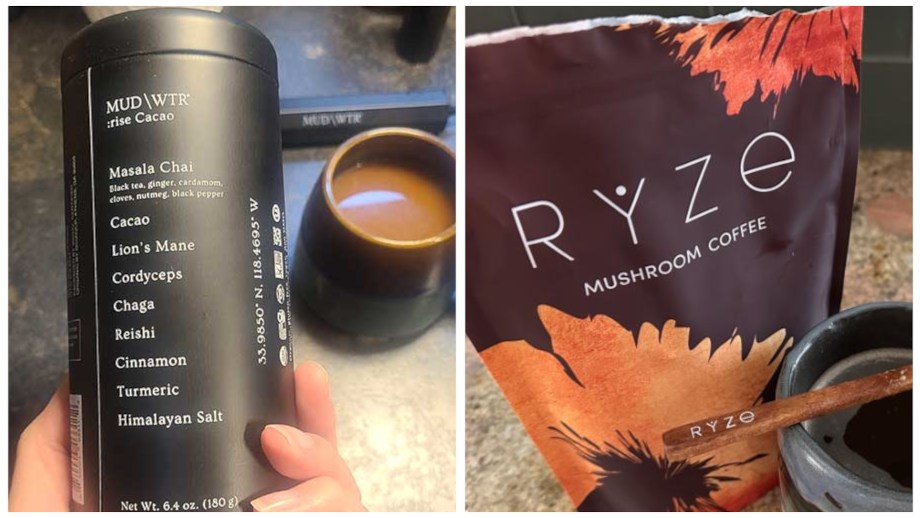We test and review fitness products based on an independent, multi-point methodology. If you use our links to purchase something, we may earn a commission. Read our disclosures.
For many of us, coffee is a double-edged sword. It can be a delicious, comforting start to the day and an effective way to boost productivity and fight the mid-afternoon slump. Some folks even drink coffee as pre-workout. For others, it can lead to jitters, worsened anxiety, an elevated heart rate, and even trouble sleeping.
Mushroom coffee is an in-demand coffee alternative used to promote overall health and wellness. It contains less caffeine than regular coffee and is made from adaptogenic mushrooms, which are revered in Ayurveda for their potential to help the body adapt to stressful conditions.
Team GGR has been testing some of the best mushroom coffee on the market, including Four Sigmatic, Everyday Dose, and the two brands in question today: MUD WTR vs RYZE.
MUD\WTR and RYZE Mushroom Coffee are two popular brands, each with a devoted fanbase and rave customer reviews. To help you choose the best replacement for your morning coffee, we’ve tested both and rated them on formulation, taste, solubility, and more. Keep reading for our comprehensive MUD WTR vs RYZE comparison.
RYZE
RYZE Mushroom Coffee
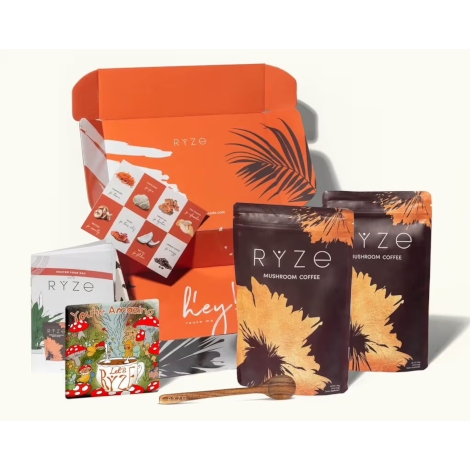
Product Highlights
- Vegan mushroom coffee with less than half the caffeine of a traditional cup of coffee
- Features California grown mushrooms and Mexican coffee
- No sugar, gluten, dairy, soy or GMOs
- 1% of profits go to teaching mindfulness in schools
- Listed benefits: Improved focus, energy without a crash, supports immune, gut, and digestive health, and optimizes brain function
Pros & Cons
Pros
- 30 Day Guarantee
- 100% recyclable packaging
- Vegan, keto, and paleo friendly
- 6 mushroom blend
Cons
- Only available in the United States currently
- More caffeine than competitors
- Mixed reviews on taste
Bottom Line
Ryze Mushroom Coffee contains both a 6 mushroom blend and coffee. Despite containing coffee the taste still received mixed reviews from people making the switch from traditional coffee. It was described as “earthy” both positively and negatively.
Product not found.
Medical disclaimer: This article is intended for educational and informational purposes only. It is not intended as a substitute for medical advice. For health advice, contact a licensed healthcare provider. GGR also recommends choosing a product that has been third-party tested for quality.
MUD\WTR vs RYZE Comparison Chart
| MUD\WTR | RYZE | |
| Price | $50.00/30 servings = $1.67 per serving without a subscription; $1.33 per serving with a subscription | $36.00/30 servings = $1.20 per serving with or without a subscription |
| Type of mushroom | Lion’s Mane, Cordyceps, Chaga, Reishi | Cordyceps, Lion’s Mane, Reishi, Shiitake, Turkey Tail, King Trumpet |
| Amount of mushrooms | 2,240 mg | 2,000 mg |
| Other notable ingredients | Cacao, Cinnamon, Turmeric, Himalayan Pink Salt | Organic Arabica Coffee, MCT Oil, Coconut Milk |
| Flavors | Original (Masala Chai), Matcha (Matcha Chai), Gold (Turmeric), Rest (Rooibos Chai) | Mushroom Coffee, Matcha Coffee, Mushroom Chicory, Mushroom Hot Cocoa |
| Caffeine content | 0, 35, or 55 mg (depending on flavor) | 0-48 mg (depending on flavor) |
| Extras | Free rechargeable frother when you sign up for a subscription | Free acacia wooden spoon with your first one-time or subscription order |
| Packaging | Recyclable, reusable metal tin | Resealable bag |
Quick Look: MUD WTR vs RYZE
When it comes to mushroom coffee, no two products are exactly the same. It’s important to consider factors like caffeine content and source, mushroom amount and type, flavorings, and extra ingredients like sweeteners and additives when choosing the best option for your needs.
RELATED: Best Clean Protein Powder
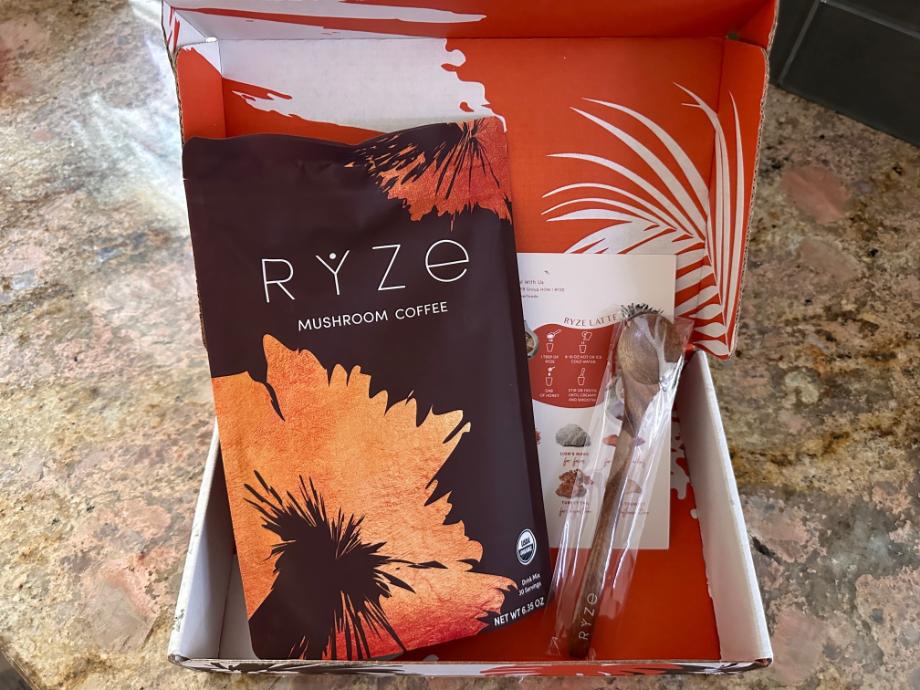
And if you’re anything like us, you want a product made from high-quality ingredients that’s been shown to be free from heavy metals and other contaminants through third-party testing.
We have both a MUD WTR review and a RYZE mushroom coffee review available, but here are the highlights:
Who Should Buy MUD\WTR
- Anyone avoiding coffee or who prefers tea
- People who specifically want chaga mushrooms
- Those who like the taste of chai spices
- People who want the highest total volume of mushrooms

Who Should Buy RYZE
- People looking for simple, unflavored options
- Those needing to save money
- People who want less caffeine but don’t want to completely give up coffee
- Anyone that specifically wants shiitake, turkey tail, and king trumpet mushrooms
- Those who want a larger variety of mushrooms
Key Similarities Between MUD\WTR and RYZE
- Organic ingredients
- No added sugar or food additives
- Contain less caffeine than a cup of coffee
- Caffeine-free options available
- Contain proprietary blends of medicinal mushrooms
- No third-party testing
- Easy to prepare by mixing with hot water
Important Differences Between RYZE vs MUD WTR
- MUD\WTR contains black tea or matcha, while RYZE contains arabica coffee
- MUD\WTR has a slightly higher volume of mushrooms overall
- RYZE contains 6 types of mushrooms compared to 4 in MUD\WTR
- RYZE costs about $0.30 less per serving
Price Per Serving
One thing that instantly stuck out to us was the price difference between these products. At $1.67 per serving without a subscription, MUD\WTR is on the higher end of the mushroom coffee spectrum and earned a 3-out-of-5 rating for price.
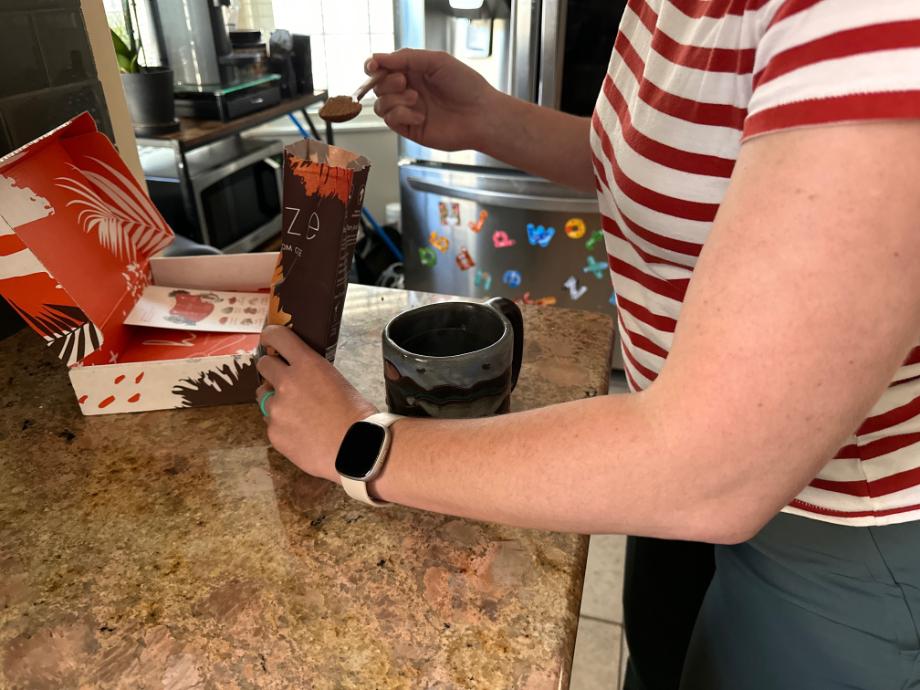
RYZE, on the other hand, is on the lower end. The average price for mushroom coffees is around $1.30 per serving, and RYZE falls well below this at $1.20 per serving. At such an affordable price, it earned a 5-out-of-5 rating from us.
Fortunately, you can save some money on MUD\WTR by signing up for a subscription. RYZE offers additional savings through their 60-serving starter kit priced at $66, or about $1.10 per serving. Each brand also offers periodic sales and discounts, such as summer and spring sales, so keep an eye out for these opportunities.
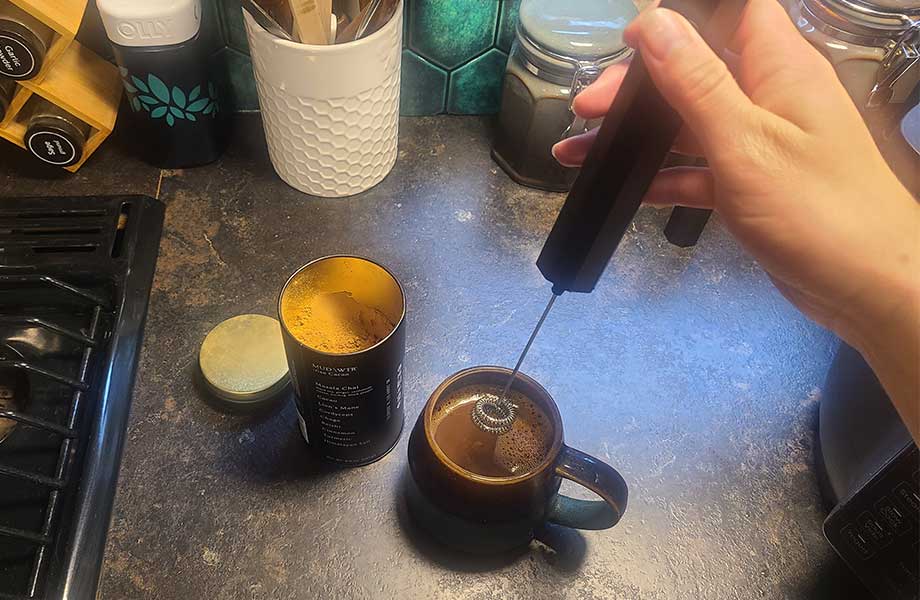
Of course, mushroom coffee is going to be more expensive than brewing your own coffee or tea at home, but it could save you money when replacing a daily latte run.
Formulation
Both coffees scored a 3 out of 5 from our expert testers, mainly for the use of proprietary mushroom blends.
“MUD\WTR is made from high-quality organic ingredients free from added sugars and fillers, but I wish they listed the amounts of each specific mushroom on the label,” said expert tester Frieda Johnson, NASM-Certified Nutrition Coach and GGR editor.
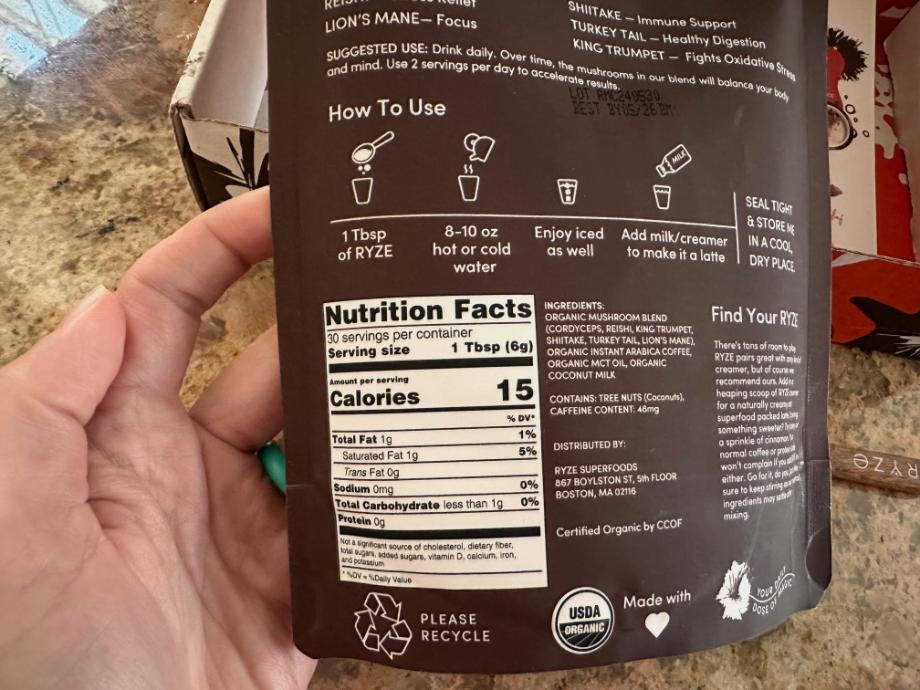
Nicole Davis, Precision Nutrition Level 1 Nutrition Coach and GGR Head of Content, had the same concerns when testing RYZE: “There are six different organic mushrooms in this blend, but all RYZE tells us is that there are 2,000 milligrams of mushrooms in total. The amounts of the individual mushrooms included are vague,” she noted.
RELATED: Protein Coffee
Why is this important? Well, if you’re interested in drinking mushroom coffee for specific benefits, you may want to choose one high in certain types of adaptogens. It’s also important to make sure that the product contains clinically effective doses, or doses which have been shown in research studies to be effective for specific conditions.
Because we don’t know the dosages of each functional mushroom, analyzing the potential benefits of these coffee alternatives is difficult.
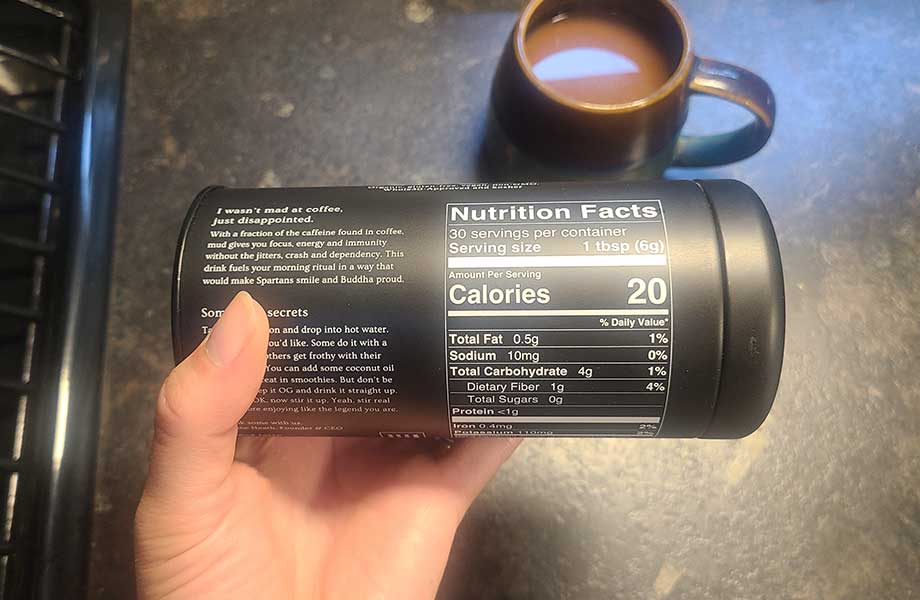
Overall, MUD\WTR contains a slightly higher volume of mushrooms with 2,240 total milligrams compared to a dosage of 2,000 milligrams in RYZE.
Keep in mind that RYZE contains arabica coffee as its caffeine source, while MUD\WTR uses black tea and cacao for a modest energy boost. Each flavor varies in its caffeine content. Both brands offer matcha options, as well as caffeine-free brews made from rooibos tea (MUD\WTR) or chicory root (RYZE).
RELATED: Best Time to Take Maca Root
Third-Party Testing
The FDA doesn’t strictly regulate dietary supplements or require testing for purity. For this reason, we strongly prefer supplements that have undergone third-party testing.
Independent testing provides consumers with peace of mind and the assurance that the supplements they’re taking are free from potentially dangerous contaminants and that the ingredient lists are accurate.
RELATED: Creatine and Coffee
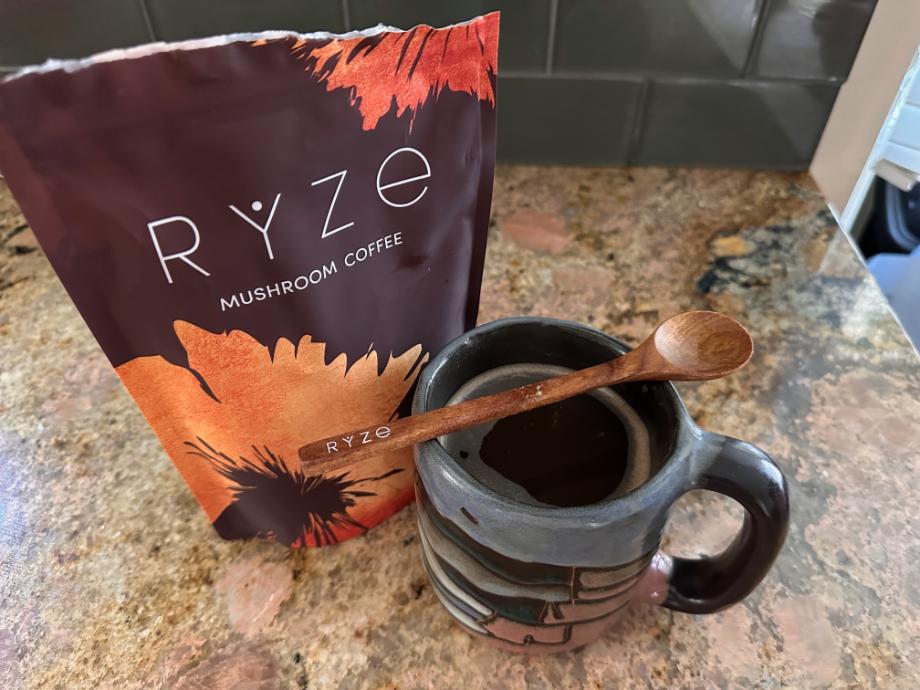
Unfortunately, neither MUD\WTR or RYZE are third-party tested. “MUD\WTR is certified USDA Organic and vegan, but I couldn’t find any mention of third-party testing on their website. It also has a proprietary blend”, said Frieda, who gave it a 2-out-of-5 rating here.
RYZE earned a 1-out-of-5-star rating for the same reasons and because it lacks certifications which could help make up for the lack of third-party testing.
Company Policies
Both companies offer a reasonable 30-day refund policy for first-time customers. Frieda gave MUD\WTR 4 out of 5 stars, knocking a point off since she couldn’t find many customer reviews that commented on their customer service, whether positively or negatively.
RYZE Superfoods got an impressive 5-star rating from Nicole thanks to their “Love It” guarantee, which offers a full refund on any bag of coffee and creamer from your first subscription order. We also found multiple reviews praising the quick customer service response times and willingness to correct any errors.
MUD\WTR vs RYZE: Final Thoughts
MUD\WTR and RYZE mushroom coffees are similar in many ways. They both contain multiple adaptogenic mushrooms, contain less caffeine than regular coffee, are unsweetened, and can help you consume more antioxidants as part of your morning routine.
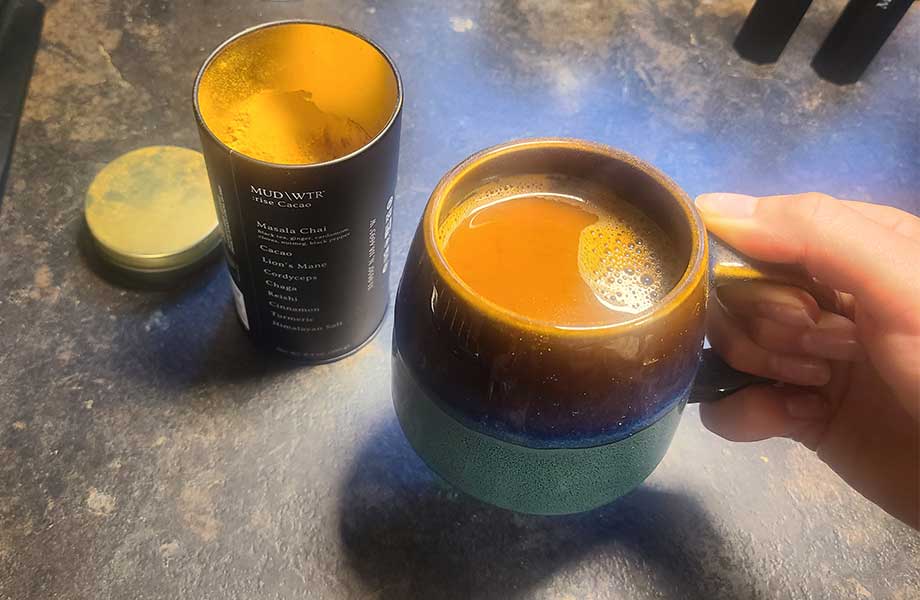
When deciding between them, we recommend keeping the following points in mind:
- RYZE costs about $0.30 less per serving, but also has fewer certifications
- MUD\WTR products are based on black tea, matcha, or caffeine-free rooibos teas, while RYZE offers options with coffee, matcha, or caffeine-free chicory root
- MUD\WTR contains a slightly higher volume of mushrooms overall
- RYZE has a larger variety of mushrooms
- MUD\WTR is flavored with chai spices, while RYZE is unflavored
MUD\WTR vs RYZE: FAQs
What’s the difference between RYZE and MUD\WTR?
RYZE contains six adaptogenic mushrooms and uses arabica coffee in its original flavor, while MUD\WTR contains four mushrooms and uses black tea. The original MUD\WTR is flavored with chai spices, while RYZE is largely unflavored. RYZE also costs about $0.30 less per serving.
Is there something better than RYZE?
This depends on what you’re looking for. If you want 240 additional milligrams of medicinal mushrooms, a product that is USDA Organic and vegan-certified, or that contains tea instead of coffee, MUD\WTR may be a better product for your needs.
Is MUD\WTR actually healthy?
MUD\WTR is rich in antioxidants thanks to its medicinal mushroom blend and use of ingredients like matcha, chai spices, and turmeric, which may help reduce chronic inflammation. However, studies showing health benefits of adaptogenic mushrooms1 in humans are lacking, so it isn’t clear whether mushroom coffees are helpful for reducing stress, improving focus, or other purported benefits.
What are the side effects of RYZE mushroom coffee?
Unpleasant side effects are rarely mentioned in RYZE customer reviews, but people who are particularly sensitive to caffeine could experience jitters, worsened anxiety, insomnia, or other side effects related to high caffeine intake.
On the other hand, many RYZE customers report better energy levels and improved bloating, but others don’t notice feeling any different.
Data on adaptogenic mushroom side effects is scarce, but a 2020 study2 in people taking 350 milligrams of lion’s mane daily had a few participants drop out due to nausea, abdominal discomfort, and skin rash.
These statements have not been evaluated by the Food and Drug Administration. This product is not intended to diagnose, treat, cure, or prevent any diseases.
References
- Venturella G, Ferraro V, Cirlincione F, Gargano ML. Medicinal Mushrooms: Bioactive Compounds, Use, and Clinical Trials. Int J Mol Sci. 2021;22(2):634. Published 2021 Jan 10. doi:10.3390/ijms22020634
- Li IC, Chang HH, Lin CH, et al. Prevention of Early Alzheimer’s Disease by Erinacine A-Enriched Hericium erinaceus Mycelia Pilot Double-Blind Placebo-Controlled Study. Front Aging Neurosci. 2020;12:155. Published 2020 Jun 3. doi:10.3389/fnagi.2020.00155
Further reading

The best folding exercise bikes are easy to store and transport, have adjustable seats and pedals, and multiple levels of resistance. Read more

Want to save money on products you were probably going to buy anyway? Check out our best Black Friday deals for runners for the most up-to-date sales. Read more

Discover our nutrition expert’s picks for the best fiber supplement for constipation based on our chosen criteria. Read more

Our Nutricost Whey Protein Concentrate review rates this popular protein on taste, solubility, price per serving, side effects, ingredients, and more. Read more

